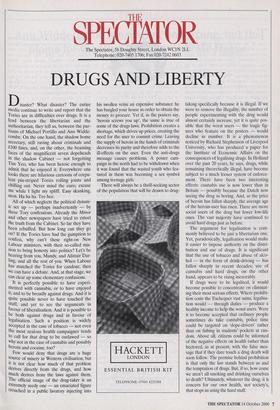SPECTATOR
The Spectator, 56 Doughty Street, London WC1N 2LL Telephone: 020-7405 1706; Fax 020-7242 0603
DRUGS AND LIBERTY
Disaster? What disaster? The entire media continue to write and report that the Tories are in difficulties over drugs. It is a feud between the libertarian and the authoritarian, they tell us, between the par- tisans of Michael Portillo and Ann Widde- combe. On the one hand, the shadow home secretary, still raving about criminals and £100 fines, and, on the other, the beaming faces of the magnificent seven dopeheads in the shadow Cabinet — not forgetting Tim Yeo, who has been heroic enough to admit that he enjoyed it. Everywhere one looks there are hilarious cartoons of corpu- lent pin-striped Tories rolling joints and chilling out. Never mind the euro; excuse me while I light my spliff. Easy skanking, mon. Ha ha ha. Tee hee.
All of which neglects the political dynam- ic set up — perhaps inadvertently — by these Tory confessions. Already the Mirror and other newspapers have tried to extort the truth from the Cabinet. So far they have been rebuffed. But how long can they go on? If the Tories have had the gumption to confess, why can't these right-on New Labour ministers, with their so-called mis- sion to bring honesty into politics? Let's be hearing from you, Mandy, and Alistair Dar- ling, and all the rest of you. When Labour has matched the Tories for candour, then we can have a debate. And, at that stage, we can clear up some elementary confusions.
It is perfectly possible to have experi- mented with cannabis, or to have enjoyed it, and to be broadly against drugs. And it is quite possible never to have touched the stuff, and yet to see the arguments in favour of liberalisation. And it is possible to be both against drugs and in favour of legalisation. Such a position is widely accepted in the case of tobacco — not even the most zealous health campaigner tends to call for that drug to be outlawed — so why not in the case of cannabis and possibly heroin and cocaine, too?
Few would deny that drugs are a huge source of misery in Western civilisation, but II is not clear how much of that problem derives directly from the drugs, and how much derives from the laws against them. The official image of the drug-taker is an extremely seedy one — an emaciated figure crouched in a public lavatory injecting into his swollen veins an expensive substance he has burgled your house in order to obtain the money to procure. Yet if, as the posters say, `heroin screws you up', the same is true of some of the drugs laws. Prohibition creates a shortage, which drives up prices, creating the need for the user to commit crime. Leaving the supply of heroin in the hands of criminals decreases its purity and therefore adds to the ill-effects on the user. Even the anti-drugs message causes problems. A poster cam- paign in the north had to be withdrawn when it was found that the wasted youth who fea- tured in them was becoming a sex symbol among teenage girls.
There will always be a thrill-seeking sector of the population that will be drawn to drug- taking specifically because it is illegal. If we were to remove the illegality, the number of people experimenting with the drug would almost certainly increase, yet it is quite pos- sible that the worst users — the tragic fig- ures who feature on the posters — would decline in number. It is a phenomenon noticed by Richard Stephenson of Liverpool University, who has produced a paper for the Institute of Economic Affairs on the consequences of legalising drugs. In Holland over the past 20 years, he says, drugs, while remaining theoretically illegal, have become subject to a much looser system of enforce- ment. There have been two interesting effects: cannabis use is now lower than in Britain — possibly because the Dutch now seeing the drug as boring. And, as the price of heroin has fallen sharply, the average age of the heroin-user has risen. There are more social users of the drug but fewer low-life ones. The vast majority have continued to avoid hard drugs just as before.
The argument for legalisation is com- monly believed to be just a libertarian one. Yet, paradoxically, legalisation would make it easier to impose authority on the distri- bution and use of drugs. It is significant that the use of tobacco and abuse of alco- hol — in the form of drink-driving — has fallen sharply in recent decades; use of cannabis and hard drugs, on the other hand, appears to be rising inexorably.
If drugs were to be legalised, it would become possible to concentrate on eliminat- ing their most serious effects. Where prohibi- tion costs the Exchequer vast sums, legalisa- tion would — through duties — produce a healthy income to help the worst users. Were it to become accepted that ordinary people sometimes do take cannabis, police time could be targeted on 'dope-drivers' rather than on fishing in students' pockets at ran- dom. Above all, citizens could be informed of the negative effects on health rather than hectored, as at present, with the false mes- sage that if they dare touch a drug death will soon follow. The premise behind prohibition is that only the law stands between us and the temptation of drugs. But, if so, how come we aren't all smoking and drinking ourselves to death? Ultimately, whatever the drug, it is concern for our own health, not society's, that stops us using the hard stuff.


















































































 Previous page
Previous page